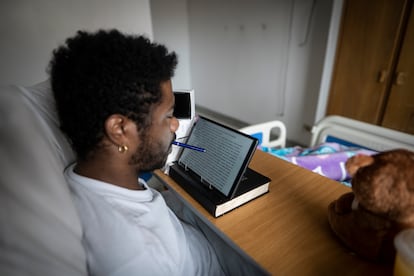Between the jungle, ‘Pedro Páramo’ and rap: The novel written by a Colombian with quadriplegia using a stylus
Jhon Anderson Hurtado’s first novel, ‘Tunda,’ opens a window into a world in which paramilitarism in Buenaventura, witchcraft in the mangroves and scavenging in the streets of Bogotá coexist


In 2018, a series of chance events brought Juan Nicolás Donoso, a native of Bogotá, Colombia, and Jhon Anderson Hurtado, an Afro-Colombian from Buenaventura on the country’s Pacific coast, into each other’s lives. Donoso, 46, received a call from a friend who had been visiting someone in a chronic care clinic. He was curious about a man in the front room, who was moving his head deftly and manipulating a tablet with a stylus he held in his mouth. He asked the man what he was doing; the man replied that he was writing a book.
In 2013, Jhon Anderson Hurtado, 31, was shot several times in a score-settling episode in the shady environment of Bogotá’s 7 de Agosto neighborhood; he first moved there when he was working as a rim painter. A shot rang out in the air, then a bullet hit his arm and a third went into his neck, hitting his spinal cord and causing cervical spine trauma. He was left paralyzed below the neck. That was 10 years ago, and Anderson Hurtado has been in five clinics since then.
“You are a writer. Why don’t you go and give him some advice? See how it goes,” Carlos Castro, an artist, suggested to Juan Nicolás about the novel that Jhon was writing. He gave him the details and hung up. Although he didn’t quite understand what he was getting into, Nicolás — as people close to him call him — set up a meeting and went to visit him. He found Jhon in a room, hidden among boxes and things, behind a makeshift desk that the nurses had arranged for him above the gurney. “I saw that he had a tablet in front of him, and that he was a functioning person; he was writing a novel using his mouth!” Nicolás recounts. “He sent me a preview on WhatsApp, and I immediately said: this man is a writer. This needs to be published.”
“It’s a novel that throws itself at you when you read the first paragraphs,” comments Nicolás, a visual artist with a master’s degree in philosophy and Literary Production, a teacher and the author of the novels Siberia (2019) and Coprófago Paradise (Coprophagous Paradise; 2016). He commented on drafts that Anderson Hurtado sent him, recommended readings and visited him once a month to finish revising the text. More than helping Anderson Hurtado, Nicolás realized that he was being transformed by Jhon: by his life story, the voracity with which he read, the facility with which he absorbed knowledge, the wildness of his stories and the surprising spelling of a young man who had left school in the seventh grade and only years later received his bachelor’s degree online, from bed. Jhon left him with no excuses.
After three years — including one global pandemic — Jhon Anderson Hurtado’s first novel, Tunda was born. It was published in October 2022 by Cain Press. It is one of the best-received independent books at the most recent Bogotá Book Fair. Tunda portrays the environment that shaped Anderson Hurtado’s life: the arrival of paramilitarism in Buenaventura; witchcraft (everyone there does it, or has had it done, or knows about it; it is normal, Nicolás explains); there is also the jungle, the imposing geography, the toxic waste and abandonment. Its originality stems from the fact that the author does not speak about what he read or what he was told, but rather he talks about the hostility that absorbed him and ended up with him getting shot. “Sooner or later, the circumstances were going to lead me to this,” he says.
Jhon grew up around the sounds of the casas de pique (murder houses), places where people are tortured, murdered and dismembered; they serve as the backdrop for his literary work. “Yes, I was a witness, and one way or another, I also wanted to exercise that kind of violence, and I ended up doing it, not by being part of some group but with outbursts of anger, moments out there, drugged, in some club.”

In the novel, Buenaventura is “a tropical paradise, but also an infamous swamp of poverty, hit viciously by all kinds of primary evil.” Jhon lived his golden age there. “When I was a child,” he says, “I went out to play… I played hide and seek; I went on trips to the jungle, to explore the mangrove swamp, the shipyard, swimming in the tide, and that was the most beautiful thing.”
He was always “a person open to fun, to adventure,” and says he was “curious and a little rebellious too.” Until he ended up “in trouble,” and went into exile in Bogotá. There, he lived by scavenging in mechanics’ workshops in the capital’s 7 de Agosto neighborhood. Now, in hindsight, through his experience and the catharsis he finds in writing, he has reconciled with his past and believes that so much violence doesn’t make sense: “What shocks me is that, the people you grow up with, end up becoming paramilitaries themselves and hurting the same people.”
Mythology and the street
La Tunda, a central character in the mythology of the Colombian South Pacific and the Ecuadorian North Pacific, is described in the book as a “fright that appears to people in the bush, to misguided children, to drunks, to unfaithful people and to those who are dirty and damaged.” Within the novel, it is a specter that is made up of “voices and afflictions moving around in the dark,” an exploration of the paranormal in the middle of a mangrove swamp, and of “the smell of bazuco intermingled with black exhaust smoke.”
Jhon’s language comes from the street and from life. Donoso believes that he is a new reference in Afro-Colombian literature. He reminds him of Arnoldo Palacios, a writer from Chocó who also had a mobility problem as a result of poliomyelitis. In his novel Las estrellas son negras (The stars are black), “he is in the Chocó jungle, listening to the other children playing outside, and he cannot move. So, he begins to become a writer based on how he imagines the others playing.
Nicolás describes Jhon’s literature as a mix of Palacios, Pedro Páramo — Juan Rulfo’s classic of Mexican literature — and a lot of rap. But what he likes most is that Anderson Hurtado “didn’t write thinking: I’m going to inscribe myself in a Black, Afro-Colombian place of wording, but rather: I’m going along a trail with a machete. That is what makes his prose so vital. It is not contaminated by a discourse that, after so much repetition and repetition, mummifies you in the end.”
Pedro Páramo was undoubtedly one of the books that most influenced Anderson Hurtado; it helped him build a phantasmagoric aura in the novel. Another work that served as a model for him was Truman Capote’s In Cold Blood. “I don’t know why the descriptions with which Tunda begins — descriptions of the jungle — reminded me of Capote’s descriptions of Kansas,” says Nicolás. “One’s a desert and the other is a jungle. They are two totally different geographies, but I told him: read this and take it as far as you can. And it turns out that he loved it because, in his former life, he was those characters; he knows what cold-blooded is, and he writes in cold blood, too.”
Jhon continues to navigate the geography familiar to him: the mangrove swamp, the street with the shipyard and the 7 de Agosto neighborhood, which remains etched in his memory. “But he is flying solo now,” comments his editor. Now he is working on a new book of short stories, which he combines with virtual psychology studies. He is in his sixth semester, and he is using the techniques he has learned on himself. “All of this has been very difficult to cope with and a direct consequence of being like this, obviously, is developing psychological, emotional problems,” he says. He is tormented by “ending up condemned to live in clinics and hospitals.” So, he writes at all hours of the day and turns to psychology, which he says has helped him a lot: “I try to meditate, evaluate myself and develop resilience, but it has been very difficult. It’s consuming me.”
Sign up for our weekly newsletter to get more English-language news coverage from EL PAÍS USA Edition
Tu suscripción se está usando en otro dispositivo
¿Quieres añadir otro usuario a tu suscripción?
Si continúas leyendo en este dispositivo, no se podrá leer en el otro.
FlechaTu suscripción se está usando en otro dispositivo y solo puedes acceder a EL PAÍS desde un dispositivo a la vez.
Si quieres compartir tu cuenta, cambia tu suscripción a la modalidad Premium, así podrás añadir otro usuario. Cada uno accederá con su propia cuenta de email, lo que os permitirá personalizar vuestra experiencia en EL PAÍS.
¿Tienes una suscripción de empresa? Accede aquí para contratar más cuentas.
En el caso de no saber quién está usando tu cuenta, te recomendamos cambiar tu contraseña aquí.
Si decides continuar compartiendo tu cuenta, este mensaje se mostrará en tu dispositivo y en el de la otra persona que está usando tu cuenta de forma indefinida, afectando a tu experiencia de lectura. Puedes consultar aquí los términos y condiciones de la suscripción digital.








































